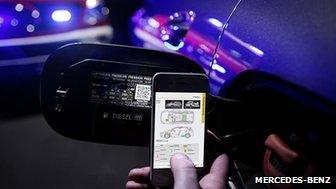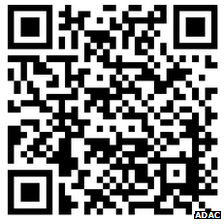Mercedes-Benz adds QR codes to save car crash victims
- Published

Mercedes-Benz car schematics can be downloaded within seconds of a QR code being scanned
Daimler is to paste Quick Response (QR) code stickers on to its Mercedes-Benz cars.
The black-and-white square barcodes are designed to help firefighters and paramedics get critical information needed to save car crash victims.
The QR codes direct smartphones to a webpage showing how to cut into each type of vehicle to free its passengers.
The firm said it had waived the right to patent the innovation so that others could use it free of charge.
Until now, Daimler said, if a vehicle was damaged beyond recognition, emergency workers might have to call in its registration plate to obtain the necessary details.
"[It] informs about the location of the airbags, the battery, the tanks, electric cables, high-pressure cylinders and other components - in the case of hybrid models the location of the additional batteries and high-voltage cables, too," a press release said, external.
"This information can save lives, because in an emergency every action counts and every second is precious."
The idea builds on an existing campaign by Adac - the German automobile club - to encourage drivers to keep an A4 sheet of paper containing a "rescue map" inside their sun visor.
Mercedes said it would stick one QR code onto the inside surface of each vehicle's petrol tank flap and another on to the pillar built between the two doors on the car's other side, since it is rare that both areas are badly damaged in an accident.

QR codes were invented by a Japanese car parts maker in 1994
This is not the first time such information has been offered in digital form.
Moditech, Field Applications and Extraction Zones are among companies already offering apps which provide a range of car schematics targeted at the emergency services.
However, a QR code offers the advantage that the rescue worker would not have to match a vehicle to the relevant diagram in the app's library.
Even so, Daimler's innovation threatens to be superseded by another technology before the end of the decade.
The European Commission is helping fund development of eCall - an initiative which proposes that vehicles carry a device that calls an emergency number in the case of a serious accident. It would send details of the car's location, design and other relevant information even if the driver fell unconscious.
Officials aim to begin testing the innovation, external in 2015.
- Published31 January 2013
- Published18 September 2012
- Published13 August 2012